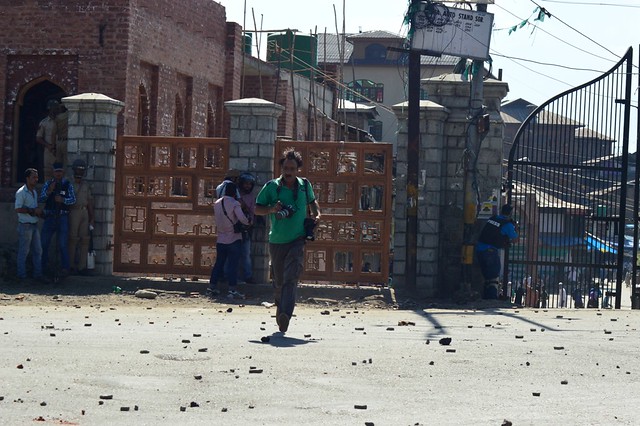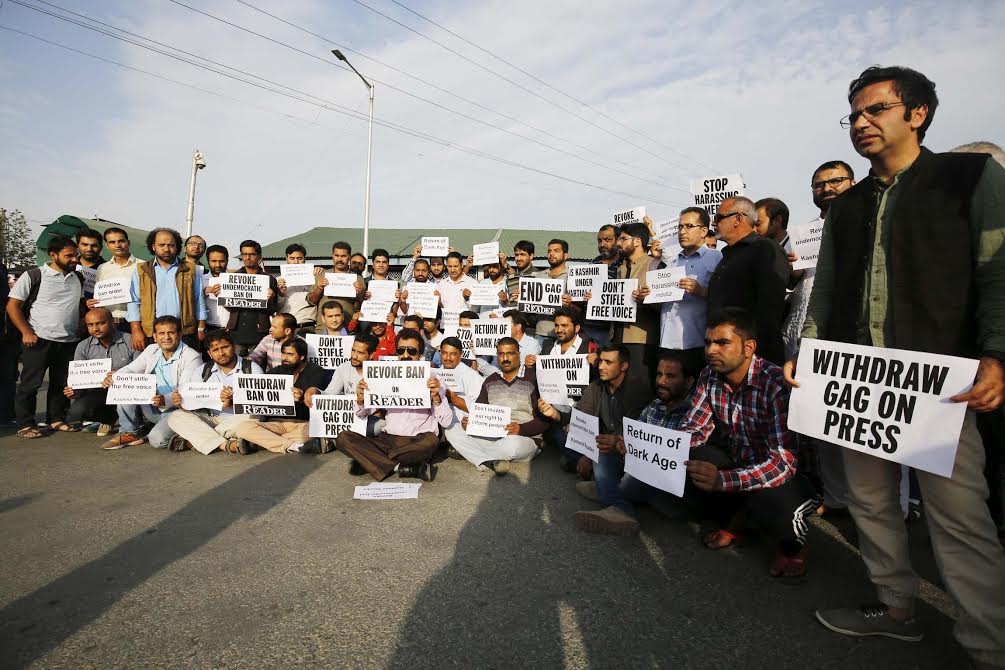A newsroom can often be the most nerve-racking, jarring, or the most fun-filled place for a professional journalist. Given the speed at which news travels these days, it is also a place where decisions are taken in a heartbeat and executed within seconds. In all, the newsroom lies at the heart of any media organisation; be it a website or an old-school newspaper.

Not if you happen to be a current employee of Kashmir Reader.
Take the case of Marouf Ahmed Parray. He comes twice a week to work, sits in office, and then goes home. He is employed at the newspaper, at least for the time being, but for the past one month has been without work. Junaid Nabi Bazaz, a correspondent with the newspaper, has similarly been coming to office, but has no work.
On October 2, when the newspaper was banned, the management had paid him, along with all the other staffers, the salary for September. However, the staff remains in the dark regarding whether they will get salary this month. The reason is self-explanatory: they haven’t worked as their newspaper stands banned and the newspaper hasn’t earned anything due to halt in operations. In short; no advertisements, no circulation, no income.

At the same time, Bazaz is aware of the repercussions if the ban on the newspaper isn’t revoked at earliest. “Imposing ban is like killing an institution. It is a loss to our owner as well as to us. We lose our employment and he loses his investment,” said Bazaz. And the potential impact isn’t lost on the staff.
“If salary for this month isn’t credited it will surely affect me. In the backdrop of continuous ban, I have to look for another job in Kashmir, which already has so few jobs,” he added.
Regarding the media job market in Kashmir, Marouf adds, “Every news organisation is facing crisis in the backdrop of continuous shutdown. It will be difficult to find job in such situation.”
As per Bazaz, nearly 50 to 60 people who are directly connected with Kashmir Reader will lose their job if the ban isn’t revoked.
Dilemma of Kashmiri journalists
The reality is that in Kashmir, even if you are employed as a journalist and getting paid for it, you are perennially in danger, every day of the week. In the last few months, they have been abused and thrashed by security forces as well as protestors, all an attempt to impact the way news is written. But the new trend of imposing bans is setting a precedent so as no one writes against the interest of the state.
The government has understood that if a journalist is injured or abused, he/she will still muster courage to report objectively but if their source of subsistence is threatened, most probably he will be left with no option other than being ambiguous in reports.
The biggest problem with Kashmiri people and its media is that no body sides with them when they are at the receiving end.
Kashmir Reader is no NDTV, so few outside Kashmir care
When the BJP-led central government decided to put a one-day ban on Hindi news channel NDTV India, the outrage against the move across the nation ensured that the government take back its decision. Journalist bodies, student unions, civil society members and common citizens in Delhi and a few other places spoke eloquently on how this ban was a sign of a ‘fascism’ and that the channel was instead upholding journalistic values and not opposing them.
But why so silent about Kashmir Reader?
First, the name and the location of the paper: Kashmir. During the initial day of ban on Kashmir Reader, it did garner support from few organization from other Indian states but within a week or so, the matter was swept went under the carpet and their journalists were left to fight their own battle, as has often been the case when it comes to Kashmir.
Solidarity might be the flavour of the season, but in case of Kashmir, even that comes with its own conditions: never too much, never too long, and almost never against the State. NDTV was accused of almost colluding and helping the enemy–Pakistan–while Kashmir Reader was banned for publishing content which was meant to incite acts of violence and disturb public peace. Mind you, this was at a time when more than 70 people had been killed and over 2,000 injured. NDTV, even when it erred, had the nation’s ear; in case of Kashmir Reader, the nation and the mainstream media was not interested beyond a point. While speaking over different treatment to ban on NDTV and to his newspaper, Hilal Mir, Editor, Kashmir Reader said, “It is very unfortunate. It shows the mindset which is guiding Indian state in guiding its media.”
What lies next for Kashmir Reader
Briefing about the present status of talks with the government regarding revoking of ban, he said, “We are not deliberating any longer with the government. The Editors body of Kashmir did meet the Chief Minister, Mehbooba Mufti but her behavior was discouraging. Now editors body is talking to some top bureaucrats and they are assuring them that ban will be lifted but no fixed date is being given as such.”
In case the ban is not lifted, the last option is to knock the doors of the court, according to Mir.
As the ban on the Kashmir Reader enters its second month, there is no clear indication from the state government to revoke the ban.The journalists associated with the newspaper will be left with no jobs and it will be discouraging for other journalists who report conflict objectively from Kashmir.
But in Delhi, Baagon mein Bahaar Hai.
(This article was first published on TwoCircles.net.)